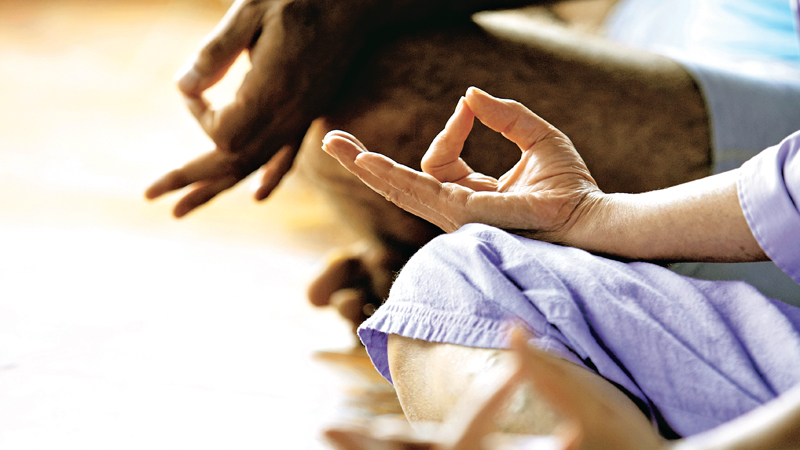Living mentally healthy life
KATHMANDU: Physical, social, and mental health are important aspects in one’s life. However, the mental aspect of health is often neglected. Therefore, with the objective to raise awareness of mental health issues around the world and mobilise efforts in support of mental health, the World Mental Health Day is observed on October 10 every year. This year it is being celebrated with the theme ‘Dignity in mental health’.
Higher mental function of brain such as emotional, thinking, judgement capacity et cetera should be intact to work as a normal human being. Minor mental illnesses such as depression, anxiety or insomnia are common in 80 per cent of patients with mental illnesses. There are only 10 to 20 per cent of major illnesses in the patients,” informed Professor Dr Saroj Prasad Ojha, Consultant Psychiatrist, Head of Department, Tribhuvan University Teaching Hospital, Maharajgunj. “These major illnesses include bipolar disorder and schizophrenia among others,” added Dr Ojha.
Symptoms
Long-term headache, pain in body parts, palpitation, restlessness, change of thoughts, fear, trance and possession, loss of consciousness, seizures, sadness, decreased energy, loss of interest, irritability, distracted sleep, loss of appetite, burning sensation all over the body, no desire for sex — “such symptoms can be seen in people at any point of time but if such depressive symptoms last for at least two weeks, then one must understand that s/he needs consultation with a psychiatrist,” informed Dr Ojha. However, showing different types of behaviour such as being extremely happy, talking more than one’s ability are some of the symptoms of major mental problems. Delusion, disorganised behaviour such as people spitting wherever they like, walking naked, doing whatever they want to, excessive anger are some of the symptoms of major illness. “If minor problems aren’t treated, then it leads to chronic ones,” informed Dr Sanjeev Chandra Gautam, Consultant Neuro Psychiatrist, Department of Psychiatry, Nepal Medical College and Teaching Hospital, Attarkhel, Jorpati.
Bio, psycho, and social causes
There is not one cause for mental health disorders. Biological, psychological and social causes play an important role. “People with a family history of mental health disorder are prone to develop one. People with personality traits such as introvert and extrovert in nature, stress factors such as financial burden, failures in exam, financial debts and lack of education too are some of the causes,” shared Dr Ojha.
Organ related diseases too are some of the causes for mental illness. People suffering from various diseases are prone to depression, change in behaviour and anxiety. “Alcohol consumption, recreational drugs are also some of the causes for mental illness,” added Dr Gautam. Disasters such as war, flood, landslide, earthquake et cetera are also the causes of mental illnesses. People develop post-traumatic stress disorder whenever there is such disaster. Some patients return to normal after a few days but for some it leads to insomnia, abnormal behaviour, disturbance in daily activities et cetera. “Such patients need psychological intervention,” added Dr Gautam. However, coping with such disasters depend upon the nature and personality of the people.
People from age group 20 to 40 are more vulnerable. But there are elderly and children too suffering from mental illnesses. “Females are prone as most are unemployed, uneducated, do not have financial and family support and face discrimination,” shared Dr Ojha.
Condition in Nepal
People suffering from mental illnesses have drastically increased in the country after the earthquake of April 25, as per Dr Ojha. But, there is lack of awareness in people. It is taken as a taboo. The patient must not be disappointed for his/her psychological problems but here people look for the patient with a different perspective.
“Minor mental illnesses too are taken as a major one. This is why public awareness must be increased in people,” added Dr Ojha. Most of the mental illnesses are treatable. To help patients get relief from the illness and financial burden health services must be available at least in district hospitals,” opined Dr Ojha. “Mental health must be integrated intricately with physical health,” shared Dr Gautam.
Several mental illnesses can be dealt with proper counselling, first aid, talking with patients and through relaxation therapies. Patients are discriminated and stigmatised for their illnesses. To help patients cope with the problems and live a life of dignity, family and society must be helpful and cooperative. “To get knowledge about mental issues, mental health must be included in the curriculum so that the younger generation will become aware about the ways to cope and live with dignity in society,” shared Dr Gautam.
Yoga, meditation, and physical exercises help in relaxing one’s mind and sharing emotions and ventilating stress and these are helpful for people to live mentally healthy life.






